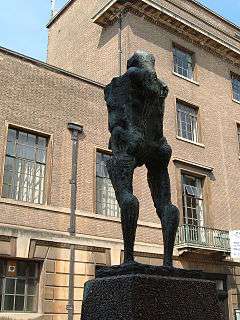Michael Ayrton
| Michael Ayrton | |
|---|---|
|
| |
| Born |
Michael A. Gould 20 February 1921 London, England |
| Died |
16 November 1975 (aged 54) London, England |
| Resting place | St Botolph's Church, Hadstock, Essex |
| Nationality | British |
| Occupation | artist, writer, painter, printmaker, sculptor, critic, broadcaster and novelist |
Michael Ayrton (20 February 1921 – 16 November 1975)[1] was an English artist and writer, renowned as a painter, printmaker, sculptor and designer, and also as a critic, broadcaster and novelist. His varied output of sculptures, illustrations, poems and stories reveals an obsession with flight, myths, mirrors and mazes.
He was also a stage and costume designer, working with John Minton on the 1942 John Gielgud production of Macbeth at the age of nineteen, and a book designer and illustrator for Wyndham Lewis's The Human Age trilogy. An exhibition, 'Word and Image' (National Book League 1971), organised with Wyndham Lewis, explored their literary and artistic connections.[2] He also collaborated with Constant Lambert and William Golding.
Life and career
Ayrton was born Michael Gould, son of the writer Gerald Gould and the Labour politician Barbara Ayrton, and took his mother's maiden name professionally. His maternal grandmother was the electrical engineer and inventor, Hertha Marks Ayrton. In his teens during the 1930s he studied art at Heatherley School of Fine Art and St John's Wood Art School, then in Paris under Eugène Berman, where he shared a studio with John Minton. He travelled to Spain and attempted to enlist on the Republican side in the Spanish Civil War, but was rejected for being under-age.[3]
In the 1940s, Ayrton participated in the BBC's popular radio program The Brains Trust.[4]
Beginning in 1961, Michael Ayrton wrote and created many works associated with the myths of the Minotaur and Daedalus, the legendary inventor and maze builder, including bronze sculpture and the pseudo-autobiographical novel "The Maze Maker" (Holt, Rinehart and Winston, 1967). He also wrote and illustrated "Tittivulus Or The Verbiage Collector", an account of the efforts of a minor devil to collect idle words. He was the author of several non-fiction works on fine art, including "Aspects of British Art" (Collins, 1947).[5]
He died in 1975.
In 1977, Birmingham Museum and Art Gallery organised a major retrospective exhibition of his work which subsequently went on tour.[6]
His work is in several important collections including the Tate Gallery, London, National Portrait Gallery, London, Museum of Modern Art, New York, Fry Art Gallery, Essex.
Selected writings
- 1946: British Drawing. London: Collins ASIN B00149X1DM
- 1947: Aspects of British Art. London: Collins
- 1953: Tittivulus or The verbiage collector. London: Max Reinhardt
- 1962: The Testament of Daedalus. London: Methuen. Reprinted 1991, with a foreword by Rex Warner: London: Robin Clark, 1991. ISBN 086072140X
- 1967: The Maze Maker: a novel. New York: Holt, Rinehart and Winston
- 1972: Fabrications". London: Secker & Warburg. / New York: Holt, Rinehart and Winston. 1973
See also
References
- ↑ T. G. Rosenthal, "Ayrton , Michael (1921–1975)", Oxford Dictionary of National Biography, Oxford University Press, 2004; online edn, May 2008, accessed 24 Jan 2015
- ↑ The Oxford Companion to English Literature, 6th Edition. Edited by Margaret Drabble, Oxford University Press, 2000 Pp55
- ↑ Martin Baker, The Art of Radio Times, Ashmolean Museum, Oxford/Chris Beetles Limited, 2002, p. 28
- ↑ "The Brains Trust". Retrieved 27 July 2014.
- ↑ http://www.npg.org.uk/collections/search/person.php?LinkID=mp05037
- ↑ T. G. Rosenthal, ‘Ayrton, Michael (1921–1975)’, Oxford Dictionary of National Biography, Oxford University Press, 2004
Further reading
- James Laver, Paintings by Michael Ayrton (1948. Grey Walls Press, London)
- C. P. Snow, Michael Ayrton Drawings and Sculpture (1962)
- Cannon-Brookes, Peter, Michael Ayrton: an illustrated commentary (1978. Birmingham Museums and Art Gallery)
- Peter Tucker, 'The book illustrations of Michael Ayrton', in The Private Library; 3rd series, 9:1 (1986 Spring), p. 2-52
- Hopkins, Justine Michael Ayrton: a biography (1994. Deutsch, London)
- Nyenhuis, Jacob E., Myth and the Creative Process: Michael Ayrton and the myth of Daedalus, the Maze Maker (2003. Wayne State University Press, Detroit)
External links
- Examples of Ayrton's art
- Tate Gallery Collection; Letter
- Biographical notes; J. C. Leissring Collection
- Oxford Dictionary of National Biography index entry
